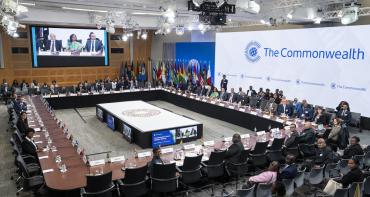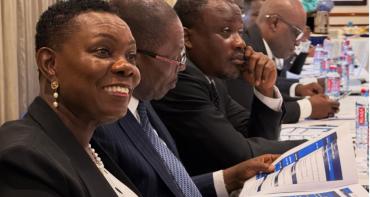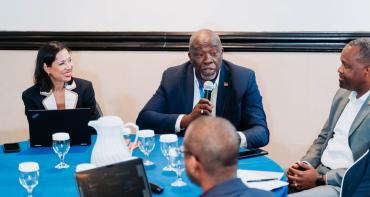How do small and medium enterprises (SMEs) in the global south find the financing they need to export more goods and services? That’s the tough question the Commonwealth, in partnership with the investment firm GBS Africa put to a panel of experts.

How do small and medium enterprises (SMEs) in the global south find the financing they need to export more goods and services? That’s the tough question the Commonwealth, in partnership with the investment firm GBS Africa, put to a panel of experts in Nairobi last week. More than 70 trade specialists and 35 journalists attended the event, which was organized on the fringes of the UN Conference on Trade and Development. Local media asked questions about the challenges SMEs face in financing their export activities. Representatives of export-import banks and development finance institutions provided perspectives on their role in helping commercial banks overcome risk so they can lend more money to SMEs, in order to strengthen businesses and stimulate trade.
The panel was moderated by Deodat Maharaj, Deputy Secretary General (Economic and Social Development) at the Commonwealth. Panelists included Anil Bharadwaj, Secretary General of the Federation of Indian Micro, Small and Medium Enterprise, Yuefen Li, Special Advisor on Economics and Development Finance at the South Centre in Geneva, and Hope Yongo, the Acting Managing Director of the Nigerian Export-Import Bank.
For Mr. Bharadwaj, it is essential to create an economic climate where SMEs can thrive: "SMEs are the drivers of growth in any economy. They are the first gauge of a country's competitiveness by their ability to successfully export their products across its borders."
The panelists discussed the historical challenges that SMEs in Africa face in accessing trade finance and recent international developments such as BREXIT that are likely to escalate them. With a global deficit of over $1.3 trillion in global trade finance, the countries that are most affected are in Africa and Latin America.
“De-risking” makes it much harder for companies in these regions to find new finance. On the advice of the Financial Action Task Force, international banks now impose tougher guidelines when they lend to SMEs, in order to combat money laundering and the flow of funds to terrorist organisations. Basel III – the global, voluntary regulatory framework on stress testing and market liquidity risk - establishes further tough standards to minimize risk. Banks are forced to rethink their business models as a result, and may restrict lending to SMEs that they perceive as high risk. As a result, SMEs face a huge challenge compared to bigger companies.
"While just seven per cent of trade finance requests by multinationals are declined by Banks, a full 50 per cent of the requests made by SMEs are declined,” stated Yuefen Li of the South Centre.
The panelists discussed alternatives and made recommendations on increasing access to export finance by SMEs. One practical step proposed by the Commonwealth is the establishment of the Commonwealth Trade Finance Facility to provide a credit guarantee scheme for participating financial institutions and promote trade flows among member states.
Another idea that seems to be working is grouping SMEs into associations, in order to give them more voice: "The newly established Commonwealth-India SME Association is a forum for linking SMEs across the region into the global value chain and providing a platform for partnership and support across the Commonwealth,” said Rashmi Banga of the Commonwealth.
Further ideas included the creation of credit rating agencies for small enterprises and the encouragement of frequent dialogue between SMEs and regulatory bodies, especially when it comes to negotiating trade deals. "There is a nexus between economic development and trade but without adequate export finance for SMEs, the opportunities to access negotiated trade preferences are missed,” commented Deodat Maharaj of the Commonwealth.
The panel discussion was open to reporters as well as trade specialists in order to build the capacity of journalists to understand international trade issues and report more accurately on complex trade negotiations



